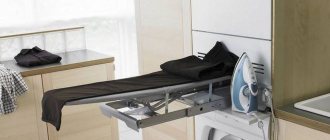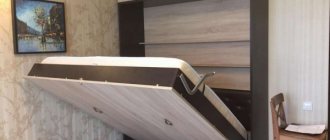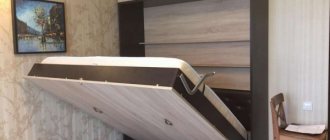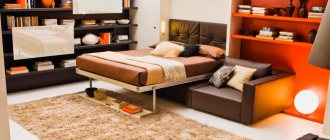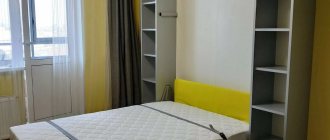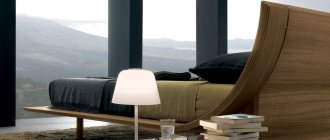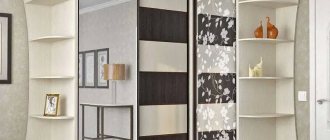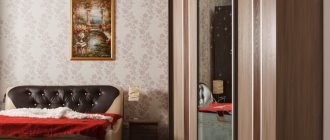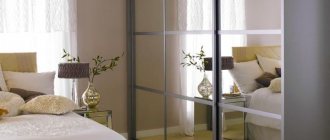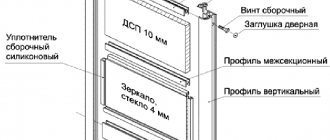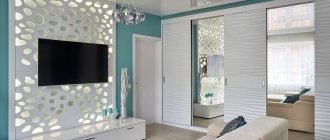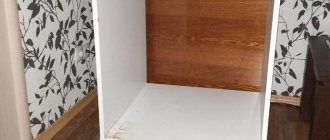A folding bed built into a closet, a transforming wardrobe bed, or, as it is now commonly called, a built-in sleeping module, is purchased mainly by those who need to visually expand the space in a difficult way and get a real square footage of usable area in small and medium-sized rooms. Whatever the reason - the need to combine several functional areas within one small room, creating an additional sleeping place or a backup module for sleeping with periodic use, a transforming wardrobe bed will help solve all these problems. Highly functional innovations in modern furniture can help us not only save space, but also obtain fairly durable, high-quality furniture that is easy to use.
Types of modular sleeping systems
In fact, each type of such modules solves the problem of lack of space, saving space in the premises and performing a multifunctional role. This can be clearly seen from the photo of the built-in bed in the closet.
It combines several zones in one small room. This is the creation of a sleeping place, a reading space with built-in lighting or daytime relaxation.
If necessary, the system quickly folds up, freeing up space for children's games or a work area.
The types of transformable beds built into the closet include the following systems:
- With one berth.
- With a couple of sleeping places.
- For children.
Among the types of systems:
- Horizontal folding. The mechanism is designed so that the bed reclines sideways.
- Vertical-folding. Systems that open from the front side. In essence, this is a lift-up built-in bed-wardrobe.
Modules with folding mechanisms of any type are made from reliable, durable materials. The systems are secure. Enterprises provide operating guarantees for up to 25 years.
When purchasing, you should pay attention to the ability of the mechanism to withstand a particular weight. Some systems are designed to accommodate a married couple, where each spouse is quite well-fed.
There are those intended for sleeping one person, weighing no more than 70 kg. This nuance is also worth paying attention to when choosing a children's bed built into a closet.
It is important to buy such furniture from reliable stores. The product itself must be certified. Then one night, when the family is sleeping soundly, the bed will not fold up spontaneously.
Many people are also confused by the fact that the system needs to be constantly transformed. But experts say that a person quickly gets used to this process and over time manipulates the mechanism almost like an automatic machine.
Creating a headboard
The headboard of the transforming wardrobe should be made of soft material, especially if the bed is intended for children. It is advisable to make soft not only the headboard, but also the lower part of the side walls of the frame. The simplest version of a soft headboard that you can make with your own hands is upholstery made of soft foam rubber. The role of foam rubber can also be performed by padding polyester.
How to make a headboard:
- Fold the softening material in several layers;
- This material must be covered with beautiful fabric with decorative elements or quilted seams;
- For ease of care, you can create a detachable hem with hidden zippers. It will be convenient to remove, wash and put on again;
- The height of the soft headboard should be at least 60-70 cm, and preferably about 1 m. This will provide soft upholstery under the back of the person sitting at the head of the bed. For the same reason, the same softening coating must be prepared for the side walls of the frame;
- The height of the foam cushion on the side walls of the frame should correspond to the height of the same padding at the headboard;
- The prepared covering can be attached to the frame or wall using screws and loops made of fabric (or elastic). If the cover is permanent, the back of the fabric cover may be stapled.
Sawing sheets
Making holes for buttons
Gluing foam rubber Repairing upholstery
Collecting buttons
Pros and cons of modular transforming systems
This design is especially important in apartments where the living room plays the role of a bedroom. During the day you need to hide in such a bed. Saving space is the first and most important advantage.
Other advantages include:
- Possibility to arrange a sleeping place in an office or small control room.
- Ease of use.
- Possibility of installing a module with one or a pair of beds.
- When folded, this bed is completely invisible. It sits comfortably in the closet.
- These systems are reliable and durable.
- Modern transformable beds are stylish in design and very comfortable. For example, when folded, when the bed is in the closet, there is a large mirror on its doors, which plays another important role. And no one will guess that inside there is a folding bed built into the closet.
- The system, which simultaneously replaces both a bed and a closet, makes it possible to conveniently store things in it. This eliminates the need for an additional purchase of a wardrobe or chest of drawers.
Often, due to improper use or manufacturing defects, the mechanism breaks down. The module becomes unusable. Other disadvantages of such designs include:
- Weight restrictions.
- Inability to mount built-in modules to plasterboard walls.
- Almost all companies involved in the production of these systems stipulate the provision of additional services for the installation of structures so that experienced specialists do everything correctly, ensuring safety. Otherwise, the plant does not provide guarantees, and employees often refuse to enter into sales contracts.
- Relatively high price.
- It is a mandatory requirement to place the transformer exclusively near the main wall.
Despite their shortcomings, built-in beds are very practical and are especially useful for providing sleeping-storage areas in small spaces.
The need for such an interior
Life defines new design standards. When a bed and a wardrobe are combined into one solution, it is an excellent solution. Moreover, different versions of such models have already been created. There are especially many types of beds for children. Here are some types:
- loft bed with drawers below;
- with hidden drawers at the bottom;
- with a cabinet at the head;
- with a wardrobe on the sides.
All these varieties serve one purpose - convenience in cramped circumstances. So that you can sleep and store linen and things. To have somewhere to put them. Especially laundry after washing.
Transforming systems for children's and teenagers' rooms
It is important to have a bed, storage space, play space, and an area for activities.
In this case, a folding bed built into a closet will fit perfectly. The less furniture in the nursery, the less opportunities for the child to get injured.
For children's and teenagers' rooms, horizontal folding systems are more often used. Vertical ones are also held in high esteem, but they require more space when reclining the bed.
In a room with low ceilings or a rather narrow one, designs with horizontal type mechanisms are preferable.
When the child is very small, one of the parents is required to be with him almost constantly at night; a system is needed with an additional seat for an adult. These are also produced, but relatively recently.
Nuances that will make choosing furniture easier
- According to the rules, renovation of a sleeping area should begin with the installation of built-in furniture. Otherwise, as mentioned earlier, you will have to make custom-made furniture;
- It is preferable to install built-in bedroom furniture in warm colors, as they promote calm and relaxation;
- Recommended materials: MFD, solid wood, chipboard;
- The frame of built-in structures is most often made from metal blanks;
- For some individual parts, drywall is often used.
Bed built into a closet in the office
In such a room it is very convenient to use this option. The transformer comes in handy when the head of the family sits at work in his home office until late at night. He doesn’t want to disturb his household by rustling around the bedroom when preparing for bed, he calmly lays out the mechanism next to the work area and lies down in Morpheus’s arms.
In such rooms it is convenient to use horizontal systems. They are very compact and designed to be lightweight, with a single bed.
Flaws
It’s worth starting with the “cons,” since the bedroom is the very place where you should like absolutely everything. If it is assumed that the introduction of built-in furniture may entail some irritating factors, it is better to abandon this idea.
There are very few of these “unpleasant” moments, but they still exist:
- The first drawback, or, to be more precise, the complexity associated with built-in furniture is that it is almost impossible to install it yourself; in any case, you will have to call the appropriate specialists to your home;
- As a rule, such furniture is made to order for a specific area of the room, so if the owner of the bedroom likes to make regular rearrangements, this furniture option is definitely not suitable for him.
Transformable beds in technical areas
Auxiliary rooms can also be equipped with these smart systems. For example, place such a bed in the space under the stairs. In this case, having previously been practically useless, this territory becomes almost the center of the house.
You can also equip the space of the hall, corridor, closet and even laundry room with a folding bed, as well as a guest room that is used by household members for other purposes (playroom, home gym).
Living room with bedroom function
This is the most common option for installing indoor beds built into closets. During the day, such a room has enough space for a living room, with a TV, a cozy sofa, and a coffee table.
And by night the room turns into a bedroom. The bed folds out of the closet and takes up space that is useful during the day but not needed at night.
Almost the same situation is typical for apartments made in the “studio” style, where almost all the useful space for living is combined. Only the bathroom is separate. The beds built into the closet in the studio area come in handy here.
Advantages
As mentioned earlier, built-in furniture is made to order: that is, it fits as accurately as possible, centimeter by centimeter, into the selected area in the bedroom;
If, for example, a wardrobe is built in, then only the doors themselves are built in. The “cabinet” is formed by the space between the doors and the wall. From this we can conclude that a built-in wardrobe is much cheaper than a regular one;
An obvious plus is compactness. This furniture was invented just to fit into the most unexpected and seemingly inconvenient places.
Features of embedded systems
As for the shapes and sizes of modular transformers, manufacturers produce a great variety of them. For larger spaces and small studios or rooms under stairs, in attics.
Beds built into niches or cabinets are made very carefully; they are universal, since they can be unfolded for a long time, even during the day, or folded when not needed.
Just pull the lever and the mechanism will open. All you have to do is put on the bed linen and go to bed.
Photo of a built-in bed in a closet
Please repost

